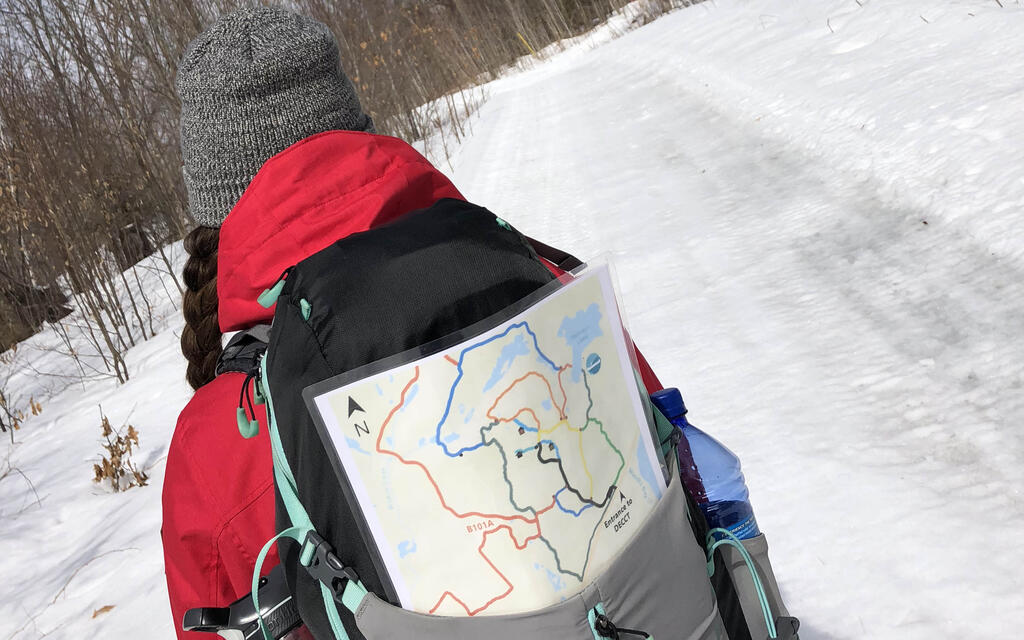Believe it or not, winter is my absolute favourite season to get outdoors and hike! The trails are little more quiet, there are no bugs, and you don’t have to get up as early to catch an incredible sunrise. If that’s not winning, I don’t know what is.
The caveat of course, is that you have to adapt to the weather and trail changes. It may seem daunting at first, but with a few insights and new responsible recreation habits, being active outdoors in winter becomes a breeze (but maybe, like, a warm one).
The Environment
Considering the strong connection between our health and the outdoors, caring for nature is a way of caring for ourselves. Here are a few things to keep in mind while recreating outdoors in winter.
- As tempting as it may be, do not feed the wildlife. And yes, this includes chickadees.
- Give wildlife wide berth if you encounter any on the trails. If they are blocking the pathway, consider abandoning the hike and backtracking to your vehicle.
- Practice fire safety and follow Leave No Trace etiquette for campfires.
The Experience of Others
When it comes to preserving the ability for all to enjoy nature, we can all work a little harder to make the experience a positive one for everyone. Here are some tips:
- Respect the changes of activity designation for some trails.
- Do not walk over groomed ski trails as it creates a dangerous hazard for skiers. This goes for humans and pets, too! Dogs are not allowed on ski trails as the holes and divots can cause injury to skiers. Note that the middle section of groomed skiing trails (the corduroy), is for skate skiers, not hiking.
- Kindly carry any dog poop bags with you versus leaving them on the trail to collect on the return. Same goes with toileting outdoors and camping food, remember always follow the Leave No Trace principals and pack out trash!
Our Safety and Self
The cold weather brings new challenges to keep ourselves safe and healthy in winter. Here are a few tips for ensuring you aren’t caught in an unsafe position when spending time outdoors.
- Always check the weather and be prepared for changes in the forecast.
- Stick to known trails as navigation can be a challenge in winter months.
- Be prepared for shorter daylight windows by choosing shorter trails, starting earlier in the day, and always carrying a headlamp with extra batteries.
- Take note that some trails, roads, and parking lots are unmaintained in winter.
- You’ll burn more calories hiking in the cold weather, bring calorie dense snacks and drink water even when you don’t feel thirsty as dehydration is common in winter.
- Dress in layers and never in cotton. Minimize sweating by adopting the “be bold start cold” mentality. Bring extra warm layers in your daypack.
- Consider gaitors, microspikes, and poles for increased stability and safety.
- Keep your car fob in a zipped pocket of your inner layer, the cold will zap the battery.
- Keep a change of warm clothes in the car including extra shoes and socks for post hike.
There is an increased risk to hikers during the fall/winter hunting season. Hikers should make themselves aware of hunting seasons, dates, and locations. Avoid hiking during dusk and dawn during these seasons and stick to the designated trail. Always wear bright coloured clothing, not only for visibility during hunting seasons but also to increase your chances of rescue during emergencies.
Detailed information on hunting in Ontario is available from the Ministry of Natural Resources.
I know, I know, it is tempting as all get out to hibernate all winter. Cozying up when the weather is inclement in our nature and I’m all for slowing down in this much too busy world. Bring on the warm fires and hot cocoa.
That said, getting outdoors in the winter and embracing the cooler weather is also good for our health! It just takes a little adjusting, some awareness, a few responsible recreation habits – et voilà, you’ll have a winter that will make others envious. Or better yet, invite friends and family to come out and join you for the fun.





